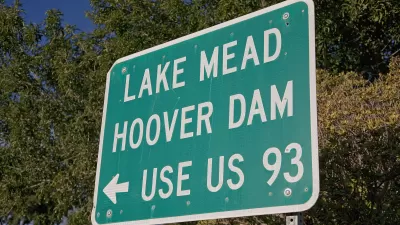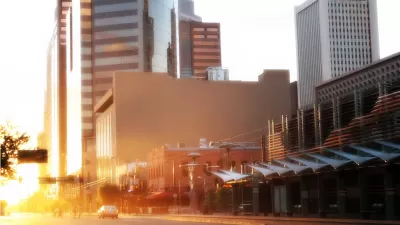Shrinkage -- the term long associated with rust belt cities like Detroit and Cleveland that saw their heydays 60 years ago and have been in decline since -- is now being applied to Phoenix and other fast-growing areas of the Southwest and Sun Belt.
The Maricopa NPR affiliate reporter interviews a realtor, sustainable development advocate, development services director, and an urban planning expert on what to do with the huge swaths of land outside Phoenix prepped for development as exurban subdivisions but now lying vacant.
"This is the land of zombie subdivisions. Some experts believe up to 1 million dirt lots in central Arizona were in some stage of approval for new homes when the market crashed," reports Peter O'Dowd.
"Urban planners are floating a radical solution for areas like this. It's known as 'smart decline.' Justin Hollander, an assistant professor at Tufts University, wrote a book called Sunburnt Cities, about smart decline in the Southwest. After the bust, he says, more than a third of ZIP codes in major Sun Belt cities saw population losses."
The vacant properties closest to the urban core present opportunities in Maricopa, south of Phoenix, for smarter development unheard of before the foreclosure crisis.
"During the boom, Maricopa planners issued 600 housing permits a month. After the bust, a single piece of land with room for 182 houses was rezoned for mixed use. The Roman Catholic Church bought it, and now there are plans for a private school, shops at ground level and loft-style housing above."
From USA Today: 'Sunburnt' cities have a shot to control growth: "Cities such as Detroit and Buffalo are trying to adjust to economic decline by shrinking smartly - concentrating development in small pockets and razing abandoned homes to make way for parks.
"There's an extraordinary potential for 'sunburnt' cities to embrace the idea of smart decline" - doing more with less, whether it's fewer people, fewer home buyers or fewer jobs, says Justin Hollander, urban planning professor at Tufts University and author of Sunburnt Cities, which was published March 1 (2011)."
FULL STORY: 'Smart Decline': A Lifeline For Zombie Subdivisions?

Maui's Vacation Rental Debate Turns Ugly
Verbal attacks, misinformation campaigns and fistfights plague a high-stakes debate to convert thousands of vacation rentals into long-term housing.

Planetizen Federal Action Tracker
A weekly monitor of how Trump’s orders and actions are impacting planners and planning in America.

In Urban Planning, AI Prompting Could be the New Design Thinking
Creativity has long been key to great urban design. What if we see AI as our new creative partner?

King County Supportive Housing Program Offers Hope for Unhoused Residents
The county is taking a ‘Housing First’ approach that prioritizes getting people into housing, then offering wraparound supportive services.

Researchers Use AI to Get Clearer Picture of US Housing
Analysts are using artificial intelligence to supercharge their research by allowing them to comb through data faster. Though these AI tools can be error prone, they save time and housing researchers are optimistic about the future.

Making Shared Micromobility More Inclusive
Cities and shared mobility system operators can do more to include people with disabilities in planning and operations, per a new report.
Urban Design for Planners 1: Software Tools
This six-course series explores essential urban design concepts using open source software and equips planners with the tools they need to participate fully in the urban design process.
Planning for Universal Design
Learn the tools for implementing Universal Design in planning regulations.
planning NEXT
Appalachian Highlands Housing Partners
Mpact (founded as Rail~Volution)
City of Camden Redevelopment Agency
City of Astoria
City of Portland
City of Laramie




























